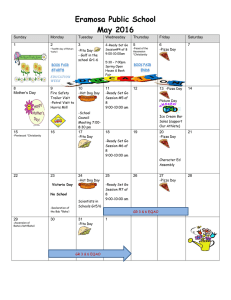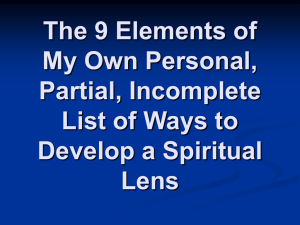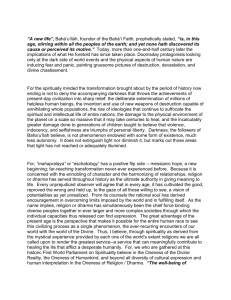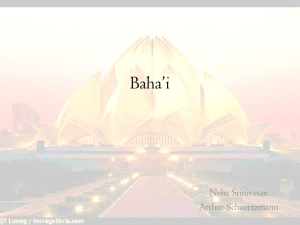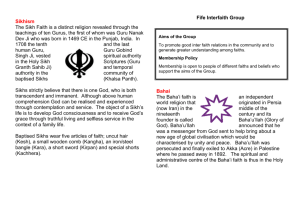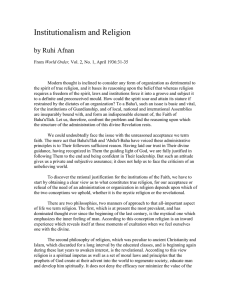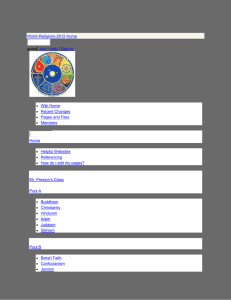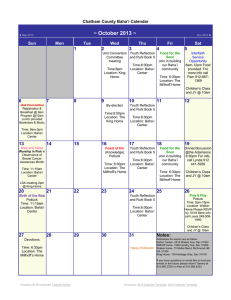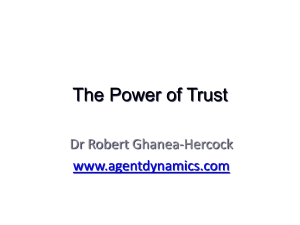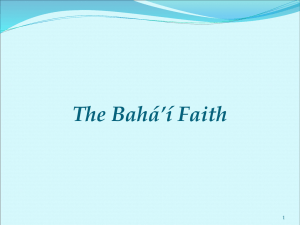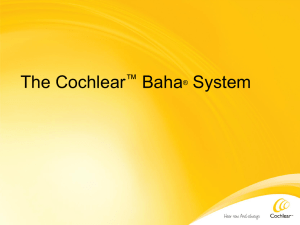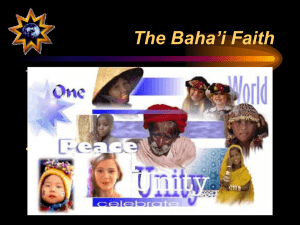Catholic Central Quiz Bowl Camp
advertisement
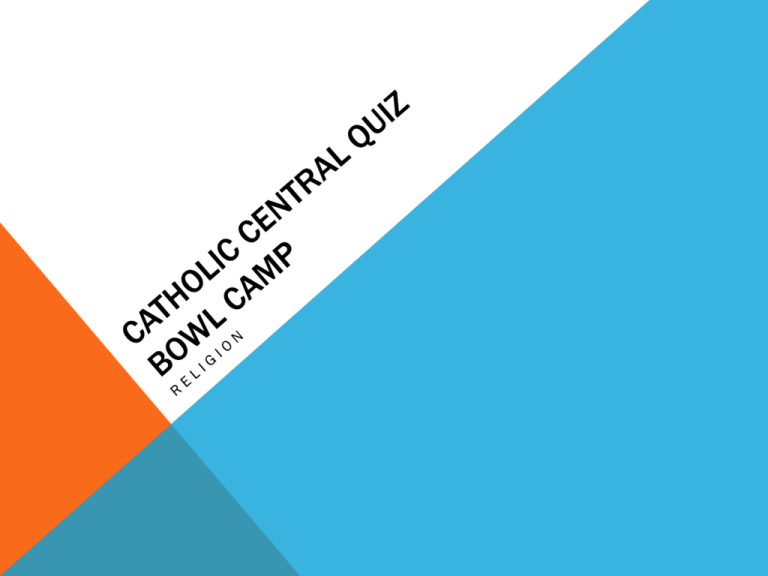
RELIGION V. MYTHOLOGY V. PHILOSOPHY Mythology is pretty much exclusively about stories Philosophy is pretty much exclusively about theory Religion is a combination of stories and theology HOW TO BE GOOD AT RELIGION 1. RESOURCES 1.Quizlet.com 2.Quizlet.com 3.Quizlet.com 4.Quinterest.com 5.Quizbowlpackets.com 6.Wikipedia.com 7.Grapesmoker.com 8.Protobowl.com 2. Learning the Bible (50% of religion) 1. Look up books and people on quinterest 2. Read the Bible (Acts, Esther) Judaism JUDAISM Abraham born c. 2100 BC 14 million followers Scriptures ~ Torah (first 5 books of Christian Bible) Holidays Hanukkah Celebrates the restoration of the Temple and the victory of Judas Maccabees over Antiochus IV (oil lasts eight days) Begins on 25 Kislev Songs sung ~ Hanerot Halalu, Ma’oz Tzur (Rock of Ages), Mi Y’maleil Money given as presents ~ “Gelt” Spinning of the Dreidel (gambling game) ~ Has sides with nun, gimel, hei, shin Also, eat jelly doughnuts (sufganiyot) and potato pancakes (latkes) MORE JEWISH STUFF Rosh Hashanah Jewish New Year 1 and 2 Tishrei (beginning of Ten Days of Awe) Followed by fast in remembrance of Gedaliah Sefer HaChaim (Book of Life) is opened by God Crumbs thrown into water during tashlikh ceremony Eat apples dipped in honey Shofar is blown Yom Kippur Jewish Day of Atonement 10 Tishrei 25 hour fast Kapporot ritual ~ swinging a life chicken in the air Prayers ~ Al Cheit, Ashamnu, Ne’ilah, Kol Nidre (vows are annulled) The High Priest pronounces the Tetragrammaton Book of Jonah is read Priest enters the Holy of Holies Men wear a kittel EVEN MORE JEWISH STUFF Purim 14 Adar Celebrates events of the Book of Esther where the heroes Esther and Mordecai foil the plots of the prime minister Haman They read the Book and when Haman’s name is read children scream and a gragger is shaken On leap years there is a “little” form In cities that were walled the “Shushan” form occurs Gifts are given ~ "mishloach manot“ People get very intoxicated so that they can’t differentiate between “Blessed is Mordecai” and “Cursed is Haman” People give alms ~ Machatzit Hashekel (three-halves of a shekel) Plays called spiels Eat Fazuelos ALMOST DONE Passover Celebrates the Exodus 15 Nisan Remove chametz and eat matzah Seder meal The youngest person asks the “Four Questions” ~ "Why is this night different from every other night?“ Beginning of the Counting of the Omer Hide afikomen Read Ezekiel’s vision of the dry bones Some use an orange to remember women rabbis Islam ISLAM Founded by Muhammad in 622 AD during the Hijrah ~ (trip from Mecca to Medina) Denominations Sunni ~ largest; recognize Abu Bakr and the “Rightly Guided” Caliphs Shia ~ smaller; recognize Ali Other ~ Ismailism, Druze, Twelvers, Seveners Five Pillars Shahadah (Testimony) ~ Islamic creed recited to become a Muslim Salat (Prayer) ~ Five times a days facing the Kaaba in Mecca (qibla) Zakat (Alms-Giving) ~ Required 2.5% charity Sawm (Fasting) ~ During Ramadan Includes the “Night of Power” Ends with Eid al-Fitr Tarawih prayer in the evenings ISLAM CONT. Hajj (Pilgrimmage) ~ Every Muslim able to must go to Mecca once during their life Hagar and Ishmael Visit the Kaaba ~ Tawaf (walk around) Celebrate Hagar visiting the Well of Zamzam Throw rocks at pillars to “stone the Devil” Men wear an ihram ~ white cotton robe Go to Mt. Arafat Camp at Mina Month of hajj ends with Eid al-Adha celebrating Abraham almost sacrificing Ishmael Mosque Minarets are towers that surround it A muezzin stands at the top of the minaret and calls people to prayer through chanting Zoroastrianism ZOROASTRIANISM Persian religion founded in the second millenium BC by the prophet Zarathustra Nietzsche book Monotheistic religion ~ Ahura Mazda (Illuminating Wisdom) Opposed by Angra Mainyu/Ahriman Spenta Mainyu (Progressive Mentality) vs. Angra Mainyu (Destructive Mentality) Asha (truth) vs. Druj (falsehood) Scriptures ~ Avesta Gathas are most important part Also include Yastas and Vendidad Symbolized by Faravahar ~ Depiction of a fravashi (guardian angel) First man ~ Gayomart After death souls must cross the Chinvat Bridge The demon Vizaresh drags bad people to House of Lies (hell) Frashokereti ~ Renewal of the world Azi Dahaka will be released and the savior Saoshyant will be born of a virgin River of liquid metal that will carry the wicked to hell ZOROASTRIANISM CONT. Zurvanism ~ Only major schism Say Zurvan is the parent of Ahura Mazda and Angra Mainyu Wear a Kushi/Kushti Daevas are evil demons Creed ~ Fravarane Towers of Silence Leave dead on top to be eaten by vultures Fire Temples Has a sacred flame that is continuously burning Sikhism SIKHISM Indian monotheistic religion founded in the 15th century Waheguru is the one God Represented by the Il Onkar symbol Major in the Punjab region of India Founded by Guru Nanak ~ Slept with his feet facing the Kaaba Led by a series of 10/11 gurus The “last” guru, Guru Gobind Singh, made the holy book, the Adi Granth, the 11th guru The Adi Granth contains the teachings of all the gurus Assembled by Arjun Dev It is also known as Guru Granth Sahib Singing hymns from it is known as Naam Japo Another book is the Janamsakhis, the biography of Nanak Temples are called gurdwaras Contains a communal kitchen called a Langar Most important one is the Golden Temple in Amritsar Five Ks ~ Things Sikhs must always have Kesh (uncut hair), Kangha (comb), Kara (bracelet), Kachera (undergarments), Kirpan (daggar) KHANDA SIKHISM CONT. Khalsa ~ initiation/baptism by drinking amrit started by Gobind Singh Amrit is sugar water stirred in an iron bowl Must wear the Five Ks Take last name Singh (male) or Kaur (female) Started when Singh asked five people to come into his tent to be decapitated, but he just cut them and initiated them Recite the Five Banis every day Has Three Pillars (just be familiar with terms) Naam Japo (contemplating the names of God) Kirat Karo (diligent work) Vand Chhako (sharing with the needy) Five Thieves (like the Seven Deadly Sins) ~ Kaam, Krodh, Lobh, Moh, Hankaar Five Virtues ~ Sat, Santokh, Daya, Nimrata, Pyaar Charhdi Kalah ~ Must accept the will of God with a positive attitude Baha'i BAHA’I Monotheistic religion that believes all major faiths are revealed by one God Founded by Baha’u’llah in the nineteenth century in Persia The Bab was a figure who prophesized the coming of Baha’u’llah Abdu’l-Baha was the son and successor of Baha’u’llah Abdu’l-Baha appointed Shoghi Effendi as his successor and made him the first Guardian Believe in several Manifestations of God ~ major figures from Abrahamic and Vedic traditions Major evangelization campaign called the Ten Year World Crusade The Bab created the Baha’i calendar ~ 19 months of 19 days + 5 extra days Symbols include the nine pointed star, the five pointed star (Haykal), the ringstone symbol, and the inscription of the Greatest Name Scriptures ~ Book of Certitude is the most important Epistle to the Son of the Wolf, The Seven Valleys, Kitab-i-Aqdas ~ Most Holy Book (Baha’u’llah), Will and Testament (Abdu’l-Baha), God Passes By (Effendi) MORE BAHA’I Universal House of Justice in Haifa, Israel Eight Houses of Worship Nine sided buildings Wilmette, Illinois Delhi, Inidia ~ Lotus Temple Believe in one world government, language, etc. Hinduism HINDUISM Possibly the oldest continuous religion Concepts (prevalent in all Vedic religions) Samsara ~ Cycle of life, death, and rebirth (reincarnation) Karma ~ Good and bad actions determine how one is reincarnated Moksha ~ Achievement of liberation from samsara Nirvana ~ State of being liberated from samsara Dharma ~ Truth, right way, moral truth Scriptures Vedas Sanskrit Rig, Yajur, Sama, Atharva Sutras Collections of proverbs or aphorisms Means “thread” because the texts were sewn together Upanishads Commentaries on the Vedas Means “sitting near” HINDUISM CONT. Mahabarata Epic detailing the Kurukshetra War between the Kauravas and Pandavas Contains the Bhagavad Gita where Krishna gives advice to the Pandava prince Arjuna before a battle Ramayana Epic about the avatar of Vishnu, Rama, who tries to rescue his wife Sita when she is taken by the king of Sri Lanka, Ravana Holidays Diwali Festival of lights Light diyas (lamps) Celebrates Lakshmi ~ Wealth New fiscal year Days celebrate love between husband and wife and brother and sister HINDUISM CONT. Holi Festival of colors Throw colored powder Starts with Holika bonfire Celebrates the defeat of the king Hiranyakashipu who wanted to be worshipped because he was indestructible. His sister Holika tried to kill his son Prahlada who worshipped Vishnu, but she got burned and Hiranvakashipu got killed by Vishnu. Buddhism BUDDHISM Founded 6th – 4th century BC by the Prince Siddhartha Gautama who achieved enlightenment while sitting under the Bodhi tree Broke off from Hinduism (kinda) Four Noble Truths ~ Central beliefs All about dukkha (suffering) ~ Where it comes from (desires), how to get rid of it), etc. Include the way to get rid of suffering, the Eightfold Path/Middle Path Represented by dharma wheel Includes “virtues” related to wisdom, ethical conduct, and concentration Cessation of existence Three Jewels Buddha, Dharma (teachings), Sangha (community) Has two major schools and lots of subsects Theravada (Teaching of the Elders) Oldest school Pali Canon/Tipitaka (Three Baskets) BUDDHISM CONT. Mahayana (Greater Vehicle) Believe in Bodhisattvas ~ People who do not enter nirvana in order to help others get there Includes Zen and Pure Land Schools Scriptures include several sutras: Perfect Wisdom, Platform (Zen), Lotus, Nirvana Zen Brought to China by the monk Bodhidharma Laṅkāvatāra Sūtra and Flower Sermon (Buddha) were important in its development Koans ~ Paradoxical sayings that aid in meditation Contained in the Blue Cliff Record and The Gateless Gate Zazen/shikantaza (meditation) Schools ~ Rinzai, Soto, Sanbo Kyodan Jainism JAINISM Major belief is ahimsa (nonviolence) Important figures are the 24 Tirthankaras (Ford-Makers) Last one was Mahavira Major sects are the Digambara (sky-clad), and Svetambara (white-clad) Disagree on whether Mallinath was a man or woman The Agamas are the most important scriptures Book of Reality is another thing Symbolized by a hand with a wheel Another symbol is the swastika Believe in Anekantavada ~ Truth can be approached in more than one way Monks adhere to the Five Great Vows Taoism TAOISM/DAOISM Chinese philosophy/religion founded by Laozi Another major contributor to it was Zhuangzi All about harmony of life with the Tao (way) Its “holy book,” written by Laozi, is the Tao Te Ching Chief concept is wu-wei, “without action” Don’t disturb the flow of the universe; go with the flow Associated with being yielding like water or being like an uncut block Three Treasures ~ compassion, frugality, and humility The Five Pecks of Rice rebellion was led by one of its Celestial Masters Deities include the Jade Emperor and the Three Pure Ones Confucianism CONFUCIANISM Chinese semi-religious philosophy based on the teaching of Confucius, who lived from 551-479 BC The Analects are mostly attributed to him Has Five Classics ~ I Ching, Classic of Poetry, Book of Documents, Book of Rites, Spring and Autumn Annals Highly emphasizes filial piety/respect for elders and the rectification of names Five Bonds ~ ruler/subject, father/son, husband/wife, older brother/younger brother, friend to friend Five Constants ~ Ren, Yi, Li, Zhi, Xin Sizi (four virtues) ~ Zhong, Xiao, Jie, Yi Confucius came up with the “Silver Rule,” which is like the Golden Rule but in the negative ~ Don’t do to others what you don’t want them to do to you Mencius was the most important after Confucius (more Neo-Confucian though) He wrote a book named after him
